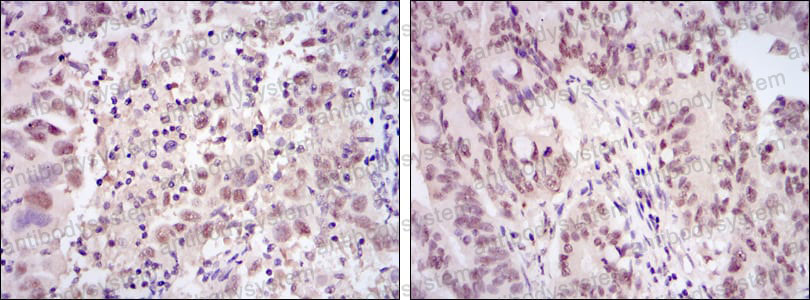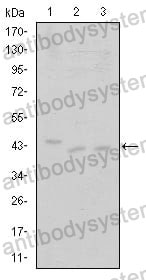Catalog No.
RHE78703
Species reactivity
Human
Host species
Mouse
Isotype
IgG1
Clonality
Monoclonal
Tested applications
ELISA: 1:10000, IHC: 1:200-1:1000, WB: 1:500-1:2000
Target
TAK, CDC2L4, C-2K, Cell division cycle 2-like protein kinase 4, Cell division protein kinase 9, Serine/threonine-protein kinase PITALRE, Cyclin-dependent kinase 9, CDK9, Tat-associated kinase complex catalytic subunit
Concentration
1 mg/ml
Endotoxin level
Please contact with the lab for this information.
Purity
>95% as determined by SDS-PAGE.
Purification
Protein A/G purified from cell culture supernatant.
Accession
P50750
Applications
ELISA, IHC, WB
Form
Liquid
Storage buffer
0.01M PBS, pH 7.4, 0.05% Sodium Azide.
Stability and Storage
Use a manual defrost freezer and avoid repeated freeze-thaw cycles. Store at 4°C short term (1-2 weeks). Store at -20°C 12 months. Store at -80°C long term.
Clone ID
R3M40
CDK9 recruits HUWE1 to degrade RARα and offers therapeutic opportunities for cutaneous T-cell lymphoma., PMID:39632829
Cyclin dependent kinase 9 inhibition reduced programmed death-ligand 1 expression and improved treatment efficacy in hepatocellular carcinoma., PMID:39100490
Focus on current and emerging treatment options for glioma: A comprehensive review., PMID:38689623
Novel agents and regimens in relapsed or refractory peripheral T-cell lymphoma: latest updates from 2023 ASH annual meeting., PMID:38649997
An Overview of CDK Enzyme Inhibitors in Cancer Therapy., PMID:36959160
A method for in situ visualization of Protein-Nascent RNA interactions in single cell using Proximity Ligation Assay (IPNR-PLA) in mammalian cells., PMID:36927323
Antinuclear antibodies in individuals with COVID-19 reflect underlying disease: Identification of new autoantibodies in systemic sclerosis (CDK9) and malignancy (RNF20, RCC1, TRIP13)., PMID:36738952
Novel therapies and combinations in CLL refractory to BTK inhibitors and venetoclax., PMID:36485153
Epigenetic oncogenesis, biomarkers and emerging chemotherapeutics for breast cancer., PMID:36064110
Pembrolizumab plus dinaciclib in patients with hematologic malignancies: the phase 1b KEYNOTE-155 study., PMID:34972202
The methyltransferase METTL3 negatively regulates nonalcoholic steatohepatitis (NASH) progression., PMID:34893641
MiR-224 ameliorates inflammation and symptoms in mouse model of allergic rhinitis by targeting CDK9., PMID:34761662
Role of Dot1L and H3K79 methylation in regulating somatic hypermutation of immunoglobulin genes., PMID:34253616
CDK inhibitors in cancer therapy, an overview of recent development., PMID:34094661
Site-Specific Phosphorylation of Histone H1.4 Is Associated with Transcription Activation., PMID:33238524
ASF1B promotes cervical cancer progression through stabilization of CDK9., PMID:32848135
NUT midline carcinoma of the head and neck: current perspectives., PMID:31118674
[Incorporation of novel agents into the treatment for acute myeloid leukemia]., PMID:30305501
Transcriptional targeting of oncogene addiction in medullary thyroid cancer., PMID:30135308
CDK9 and SPT5 proteins are specifically required for expression of herpes simplex virus 1 replication-dependent late genes., PMID:28743741
Positive cyclin T expression as a favorable prognostic factor in treating gastric gastrointestinal stromal tumors., PMID:27284431
Increased cyclin T1 expression as a favorable prognostic factor in treating gastric adenocarcinoma., PMID:26788195
Clinical study of the novel cyclin-dependent kinase inhibitor dinaciclib in combination with rituximab in relapsed/refractory chronic lymphocytic leukemia patients., PMID:25217392
Nonproteolytic roles of 19S ATPases in transcription of CIITApIV genes., PMID:24625964
SIRT2 directs the replication stress response through CDK9 deacetylation., PMID:23898190
Phosphorylation of CDK9 at Ser175 enhances HIV transcription and is a marker of activated P-TEFb in CD4(+) T lymphocytes., PMID:23658523
Trisubstituted pyrazolopyrimidines as novel angiogenesis inhibitors., PMID:23336010
CDK2 regulates HIV-1 transcription by phosphorylation of CDK9 on serine 90., PMID:23140174
Identification of novel CDK9 and Cyclin T1-associated protein complexes (CCAPs) whose siRNA depletion enhances HIV-1 Tat function., PMID:23110726
Assessing the responses of cellular proteins induced by hyaluronic acid-modified surfaces utilizing a mass spectrometry-based profiling system: over-expression of CD36, CD44, CDK9, and PP2A., PMID:22910856
Ser-634 and Ser-636 of Kaposi's Sarcoma-Associated Herpesvirus RTA are Involved in Transactivation and are Potential Cdk9 Phosphorylation Sites., PMID:22371709
Protein phosphatase-1 activates CDK9 by dephosphorylating Ser175., PMID:21533037
Phosphorylation of histone H1 by P-TEFb is a necessary step in skeletal muscle differentiation., PMID:21503884
Ikaros interacts with P-TEFb and cooperates with GATA-1 to enhance transcription elongation., PMID:21245044
Cyclin T1/CDK9 interacts with influenza A virus polymerase and facilitates its association with cellular RNA polymerase II., PMID:20943989
Adult stem cells exhibit global suppression of RNA polymerase II serine-2 phosphorylation., PMID:20641035
Characterization of Cdk9 T-loop phosphorylation in resting and activated CD4(+) T lymphocytes., PMID:19741158
Pivotal role of cardiac lineage protein-1 (CLP-1) in transcriptional elongation factor P-TEFb complex formation in cardiac hypertrophy., PMID:17459355
Estradiol negatively regulates HIV-LTR promoter activity in glial cells., PMID:16623639
ICP27 interacts with the C-terminal domain of RNA polymerase II and facilitates its recruitment to herpes simplex virus 1 transcription sites, where it undergoes proteasomal degradation during infection., PMID:16537625
HEXIM1 forms a transcriptionally abortive complex with glucocorticoid receptor without involving 7SK RNA and positive transcription elongation factor b., PMID:15941832
Tat acetylation: a regulatory switch between early and late phases in HIV transcription elongation., PMID:15171254
Catalytic activity of Cdk9 is required for nuclear co-localization of the Cdk9/cyclin T1 (P-TEFb) complex., PMID:12942536
Epidermal growth factor receptor expression is a candidate target of the synergistic combination of trastuzumab and flavopiridol in breast cancer., PMID:12839951
Recruitment of human cyclin T1 to nuclear bodies through direct interaction with the PML protein., PMID:12727882
Identification of a novel isoform of Cdk9., PMID:12706900
Functional coupling of capping and transcription of mRNA., PMID:12408827
Inhibition of Tat-mediated transactivation and HIV-1 replication by human anti-hCyclinT1 intrabodies., PMID:12401780
Protein phosphatase-1 dephosphorylates the C-terminal domain of RNA polymerase-II., PMID:12185079
c-Myc mediates activation of the cad promoter via a post-RNA polymerase II recruitment mechanism., PMID:11673469


